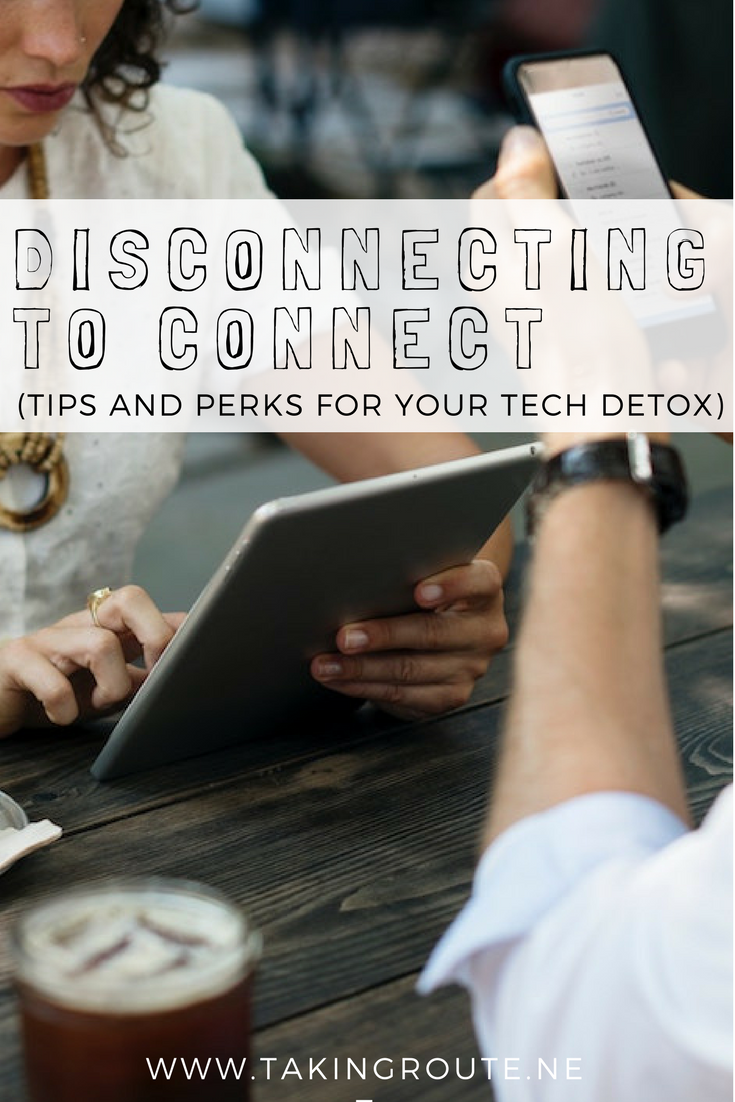Disconnecting to Connect (Perks and Tips for Your Tech Detox)
Most of us are already unplugged from our worlds—we live away from friends, family and the culture we grew up in. You might be wondering how or why you would want to disconnect anymore? Because I live overseas—and maybe you can relate— I spend a lot of time on my phone trying to connect with my other life through WhatsApp, Viber, Instagram, you get the picture. This constant connection to my passport country can sometimes leave me less present and connected to the life I am living overseas.Fortunately for me, my host country deals with many of its problems— say civil unrest—by shutting off 3G and internet countrywide for extended periods of time. It can be incredibly frustrating as you can imagine. Last week ended a four-month period of no 3G and practically useless WIFI, since most websites were blocked. Last year there was a similar two-month period of no 3G and we didn’t have internet installed in our house yet so we were truly unplugged. It might surprise that I have found refreshment in these frustrations. Yes, I said refreshment. Now I am not trying to run a business like my husband, who found the lack of internet and 3G more difficult, but even he found that there are some major perks to disconnecting in this way. When I was able to see past the frustration, it was interesting for me to see what I did with my time and how my creativity awakened during these periods of a forced connection detox.
It might surprise that I have found refreshment in these frustrations. Yes, I said refreshment. Now I am not trying to run a business like my husband, who found the lack of internet and 3G more difficult, but even he found that there are some major perks to disconnecting in this way. When I was able to see past the frustration, it was interesting for me to see what I did with my time and how my creativity awakened during these periods of a forced connection detox.
3 Perks I found during my connection detox:
- Productivity Increase. During these times I focused on the work I should be doing. I can tend do busy work that isn’t that important or soul-giving but screams at me in emails and text messages. A message can come in out of nowhere and immediately become the most important thing in my day. I noticed that I was able to check items off the list that I am never able to get to like planting a garden, writing an article I keep skipping over, actually playing with my baby and cleaning out ALL the junk drawers. Now, I wasn’t able to do banking or book flights very well, but even those things were completed when needed.
- Creativity Increase. I found the “detox” to be a time of unexpected inspiration. I did more cooking, reading, and creating than I usually make time for. There wasn’t constant white noise stealing my mind. I could sit and read without interruption. I took notes on ideas I wanted to write about. I thought. I couldn’t look up my go-to recipes online so I cooked my way through It’s All Easy by Gwyneth Paltrow. I learned so many new recipes and found endless inspiration in the kitchen. I had time think about what changes I wanted to make in my life and how I wanted to be more intentional in my marriage and with my child.
- Increased Relational Connection. My husband and I talked for entertainment. At night we weren’t distracted by our phones and emails. Most of the time my husband was able to truly leave the office. We didn’t check our emails first thing in the morning which afforded us clutter free mornings. Christmas afternoon we sat by the tree and read to each other for almost 4 hours, since we couldn’t contact our families.
4 Creative ways to create your own 3G & Internet detox:
Since some of you may not be fortunate enough to live in a place where there are built in connection detoxes, you might have to manufacture a detox of your own to get the benefits described above. Here are some ideas for your own connection detox.
- Unplug one day a week or one day a month. Turn off the data. Disconnect the WIFI. Just try it one day and see how you feel. At first you may be surprised at how challenging it is to keep from automatically checking your phone, but if you push through that initial discomfort, you will become a more present person.
- Every 6 months take a week long detox. Have your own mini-retreat from the world. Make a list of books and projects that you want to incorporate into the detox to maximize creativity and productivity. Tell friends and family that you are resting and recalibrating and then truly do it. You will start seeing and feeling a different connection to what and who is around you.
- Use internet only at certain times during the day. If you have to work with other people and can’t unplug for a full day or week, consider only connecting to the internet for limited periods of time. Become someone that is not always available, which I know is very counter-cultural. You don’t have to respond to everything within 10 minutes and if you really have to, I am so sorry and maybe you need to consider some changes in your life. Consider turning your internet on for an hour in the mornings, an hour after lunch and an hour at the end of day. That will give you time to respond to the anything that is pressing and then you can take your time to respond to the rest. Just fill up that outbox with responses, write those reports uninterrupted, and brainstorm about how to motivate your team. You won’t be distracted by every email that comes in and you will have time to attend to your essential work.
- If all this impossible for you— What about a morning or evening detox? Or no phones in bed rule? Try not looking at your emails until you sit down at your desk or the kids leave for school. Workout in peace, eat breakfast with the family and engage them in conversation. Do the same in the evenings. Simon Sinek suggest not plugging the phone in next to the bed and don’t bring the phone to the table. There are plenty of creative ways to have better boundaries with your phone and more space for your brain and your family. These seemingly small steps could create space for a conversation or idea that has been waiting for a moment to make itself known.
How do you balance technology and "real life?" Do you disconnect and detox? What has worked for you?

